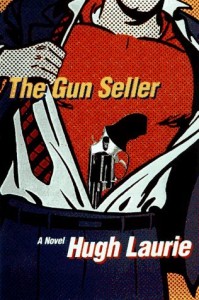
I was trying to be pithy when I said to Jill that the difference between English and American comedians is that the English ones write their own material, for books by comedians are becoming quite common on both sides of the Atlantic. There is a difference, however, and it is in the “type” of books that the two nationalities differ in: American comedians write up their monologues in a collected set of essays (Jerry Seinfield’s Seinlanguage, Bill Cosby’s books, Rita Rudner’s I’m Naked Under My Clothes, Paul Reisner’s book), whereas English comedians write novels (Python’s Terry Jones and his books for children, Stephen Fry, and the case in point). I attribute the difference to education. Your typical American comedian skipped university to work through the comedy club circuit, hoping for that gig on the Tonight Show to make a break, get their own HBO special, then maybe movies or TV. British comedians typically begin in the comedy glee club of their universities (I believe it’s the Cambridge “Footlights”, or is that Oxford? As an American, I can’t keep them straight, which is to Americans like saying I can’t tell the difference between a Yankee and a Southerner), spend years as bit actors in off-West End productions, until finally they get picked up for a movie or a starring spot in their own West End revue. The British, thus, tend to be grounded in the literature of humor, rather than just the anecdotal type so favored by the Americans. Of course, I’m making this up out of whole cloth without bothering to do a spec of research, so I wouldn’t base a thesis on it.
Hugh Laurie should be recognizable to you from his role as Bertie Wooster in Wooster and Jeeves (shown in America on Masterpiece Theater), as well as his supporting roles in the British comedy series Blackadder (a personal favorite), the Kenneth Branagh movie Peter’s Friends, the Ang Lee/Emma Thompsom collaboration on Jane Austen’s Sense and Sensibility, and the recent dreadful live-action remake of Disney’s 101 Dalmatians. The Gun Seller is his first novel, and after the Disney movie, I think he should chuck the acting business and go into writing full time, because he shows extreme promise as an author. Imagine P.G. Wodehouse deciding that he wanted to write a James Bond novel, and you’ve got some idea of what The Gun Seller is like.
The plot, which is actually more important here than it is in most modern comic novels, concerns Thomas Lang, ex-officer of the Scots Guard, who finds himself approached in Holland and asked to murder a man for an obscene amount of money. His sense of honor not only has him turn down the offer, but when he returns to England, he sets off to warn the man that someone is offering money for his death. In the best tradition, complications ensue, including the British Secret Service, the young daughter of a wealthy American businessman, an art gallery, the military-industrial complex, a terrorist organization called “The Sword of Justice,” and a “kick-ass” helicopter.
Laurie is extremely witty, and chuckling at the language in this book should be expected. Take, for example, the typical description of the attractive woman–every spy and detective book seems to have one, right?–and how Laurie makes it unique:
“She came towards me and stopped. She was shorter than she’d looked on the other side of the room. I smiled again, and she took a cigarette from the packet, but didn’t light it. She just played with it slowly, and then pointed a pair of green eyes at me.
I say a pair. I mean her pair. She didn’t get a pair of someone else’s eyes out from a drawer and point them at me. She pointed her own pair of huge, pale, grey, pale, huge eyes at me. The sort of eyes that can make a grown man talk gibberish to himself. Get a grip, for Christ’s sake.”
I like the way he is able to be self-referential without breaking the flow of the paragraph.
This book also has one of the best last lines I’ve read in a long time, making an ironic point that is quite amusing and yet also draws up the story in a conclusion. I liked this book a lot, and hope to read more by Laurie in the future.
[Finished 21 May 1997]
